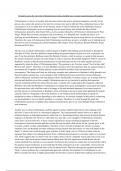Essay
Critically assess the view that Utilitarianism provides a helpful way to make moral decisions
- Course
- Institution
This was written in year 12, achieving an A+ grade and discussing whether utilitarianism is good for moral decision making
[Show more]



